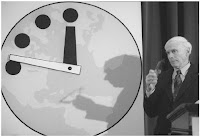As quoted in George Will's recent Washington Post piece:
"By acting without rhyme or reason, politicians have destroyed the rules of the game. There is no reason to invest, no reason to take risk, no reason to be prudent, no reason to look for buyers if your firm is failing. Everything is up in the air and as a result, the only prudent policy is to wait and see what the government will do next. The frenetic efforts of FDR had the same impact: Net investment was negative through much of the 1930s." - Russell Roberts of George Mason UniversityThose who have had the misfortune of listening to me lately will find striking similarities in what Russell perceived about the '30s and what I've been lamenting about our current predicament.
 The US Dollar is fiat money ... backed not by gold, not by collateral, but by everyone's faith in the strength and continuity of the US Government. People expect the US to continue to achieve, deliver, and grow for the foreseeable future. Thus they are happy to hold Dollars. History has proven them right: the Dollar has survived world tumult and domestic shock, inflation and stagnation without ever having a crisis of confidence (=a severe drop in exchange rate).
The US Dollar is fiat money ... backed not by gold, not by collateral, but by everyone's faith in the strength and continuity of the US Government. People expect the US to continue to achieve, deliver, and grow for the foreseeable future. Thus they are happy to hold Dollars. History has proven them right: the Dollar has survived world tumult and domestic shock, inflation and stagnation without ever having a crisis of confidence (=a severe drop in exchange rate).Underpinning this faith is stability. People trust the dollar, and it's issuer the United States, because both have historically been stable and predictable. The opposite, however, would be equally true: erratic moves by the US would cause suspicion, fear, and trepidation in people. Enough of that tumult, and people would lose faith in the dollar and the US economy. They'd flock out of Dollar-denominated assets in favor of other currencies (predominantly the Euro and Pound, with the Chinese Yuan as an interesting wild card). The US Dollar's exchange rate would tank ... not slide, not drift, but crash. This is a turn of events we cannot allow to occur.
Whereas the Feds thought their bold moves would "jump start" the economy by fiat, their erratic decision-making over the past few months has had the opposite effect, suppressing any recovery precisely because the "boldness" has scared people. Ambiguity on the future of bankruptcy law and assistance is causing households, businesses, and banks to delay
 bankruptcy filings. Ambiguity on the financial bail-out is keeping would-be bank investors from taking advantage of these bargain-basement stock prices. Ambiguity about interest rates and inflation is making banks sit on their inflated reserves rather than lending. Sounds a lot like the 1930's, no?
bankruptcy filings. Ambiguity on the financial bail-out is keeping would-be bank investors from taking advantage of these bargain-basement stock prices. Ambiguity about interest rates and inflation is making banks sit on their inflated reserves rather than lending. Sounds a lot like the 1930's, no?Rationally, those people are largely sitting on the sidelines waiting for things to calm down before they'll be willing to re-engage in economic activity. That's the generous view.
The not-so-generous view is that people see a new level of precariousness in the US economy and a new level of unpredictability in the behavior of the US government. Rationally, they are revising their expectations about the US
 economy to be a little less rosy and are beginning to act based on that new view. In this case, the horse is already out of the barn and it will be far more difficult to re-interest these people in engaging in economic activity ... at least here in the US.
economy to be a little less rosy and are beginning to act based on that new view. In this case, the horse is already out of the barn and it will be far more difficult to re-interest these people in engaging in economic activity ... at least here in the US.History repeats. Again. Don't act so surprised.
Yin/Yang Graphic credit: transaction.net
Coffee Talk Cartoon Credit: wordsellinc.com
Precarious Cartoon credit: Wide Dynamic Range




 Once again it's back to basics: incentives must be aligned. Any crack of variance between the interests of management and that of the owners will be found and exploited if not monitored like a hawk. My
Once again it's back to basics: incentives must be aligned. Any crack of variance between the interests of management and that of the owners will be found and exploited if not monitored like a hawk. My 










 Additional Reading:
Additional Reading:






